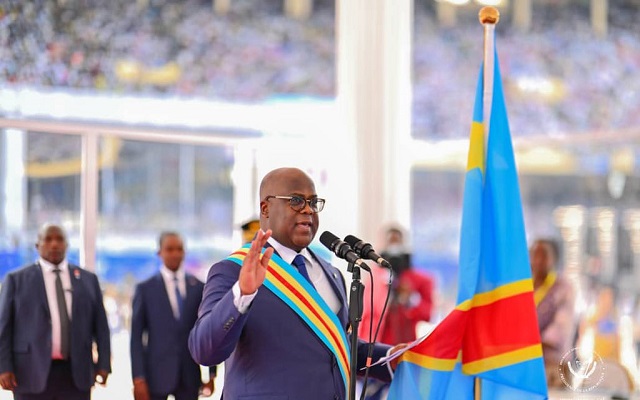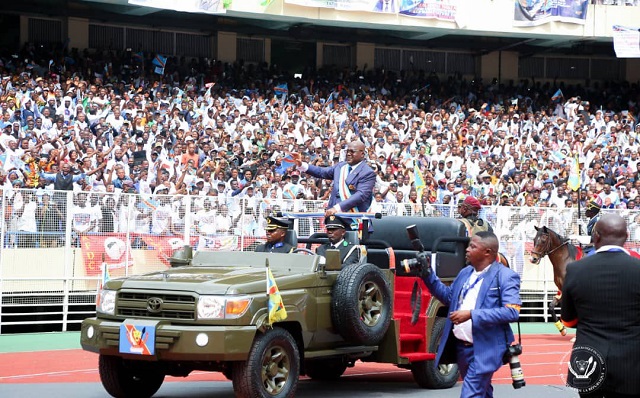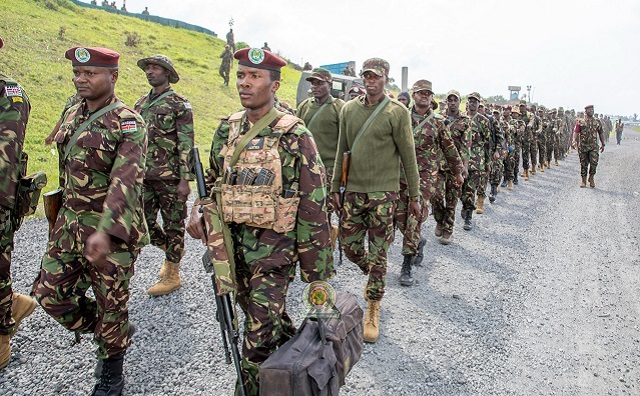
As Tshisekedi secures his second term
Kampala, Uganda | RONALD MUSOKE | When President Felix Antoine Tshisekedi Tshilombo was on Jan.20, sworn-in for his second five-year term, he said he was aware of the expectations of the Congolese people. During his campaign, Tshisekedi promised to create more jobs, resuscitate the economy and make it more resilient.
“I am taking back the baton of command that you entrusted to me. We want a more united, stronger and prosperous Congo,” Tshisekedi said during his inauguration ceremony at the Martyrs Stadium in Kinshasa. To that list, analysts say, he must add youth and women’s rights, national cohesion, and pacification of the restive eastern part of the country.
Tshisekedi had of course promised to tackle the insecurity that has plagued the east of the country for three decades leading to the deaths of millions of people. But he won following an acrimonious election campaign that rattled some of his colleagues within the East African Community. And now, it appears, the restoration of relations with most of his neighbours in the East African Community should also be top on his agenda.
Although some regional political commentators have told The Independent that the bellicose tone President Tshisekedi projected at some of the campaign rallies in the restive eastern Democratic Republic of Congo should not be taken out of context (heated electoral campaign), it remains to be seen how Tshisekedi will be seen by his colleagues in the region.
At the tail-end of his campaign in Bukavu, a town close to the Rwandan border, President Tshisekedi whipped up sentiments in the region when he called out Rwandan President, Paul Kagame, and even compared him to Germany’s World War II leader, Adolf Hitler.
In the final rally before the election, Tshisekedi even vowed to declare war on Rwanda if he were re-elected. President Tshisekedi’s war rhetoric sold in eastern DR Congo because of what the local people perceive to be Rwanda’s continued support to the M23 rebels in the region, an allegation the Rwandan government has repeatedly denied.
Stewart Muhindo, a Congolese researcher and activist affiliated to LUCHA, a non-violent, non-partisan civil society movement based in Goma thinks Tshisekedi will eventually get back on good terms with his regional counterparts.
“I think Tshisekedi just wanted to whip up the sentiments of the Congolese people in the eastern part of the country,” he says, “He knows that many Congolese in eastern DR Congo don’t like President Kagame because of what they perceive Kagame has done in eastern Congo.”
“But, after winning the election, he will begin to collaborate with them. All that he was talking about Kagame, he never meant it. He just wanted to get the votes in eastern Congo and I think it worked for him.”
“It was just his campaign rally rhetoric,” adds Pecos Kulihoshi, a Goma-based civil society activist working with COJESKI, a refugee support organisation in the city.
“Tshisekedi is no war monger; he espouses a more democratic world view. He has severally said he does not believe in war, of course, unless he is forced into it. So, that kind of ambiguity makes us skeptical of him seeking authorization from the Congolese Parliament to fight a neighbouring country like Rwanda.”
Dr. Solomon Asiimwe, a lecturer of governance at Uganda Martyrs University, Nkozi, told The Independent on Feb.01 that President Tshisekedi said nothing wrong given the context of his rhetoric.
“The statements were uttered during a heated political campaign; he was speaking in a region which has been affected by instability for a long time and he was speaking on an issue that perhaps his opponents had used against him (failure to secure and bring peace to eastern DR Congo).
“If the affected leaders are politicians or students of politics, they would know that there are statements that one can make within their territorial borders and no one will call you out,” he said.
“Under international law, this is allowed. It is different when you utter the same statements abroad or in an international conference. He was in campaign mode; he was desperate to secure a second term and he was talking about an issue he knew could be interpreted as a failure of his first tenure (pacification of the eastern Congo).”
Godber Tumushabe, the Associate Director at the Great Lakes Institute for Strategic Studies, a Kampala-based public policy research think tank appears to support Dr. Asiimwe’s view. He says it is a no-brainer for anyone to think that President Tshisekedi might struggle to get back into the East African Community fold.
Tumushabe says the Great Lakes region of Africa is characterized by leaders who mistrust one another and Tshisekedi is no exception.
“I don’t see any reason why Tshisekedi should trust them. This is a region that has leaders who despite their public rhetoric on regional integration are actually inward-looking. And if you are the president of the DRC (the Democratic Republic of Congo), you are looking at so many contradictions.”
Tshisekedi challenge
When President Tshisekedi was first sworn-in as Congo’s fourth president since independence in January, 2019, there was hope across the country but more so in the restive eastern region. For starters, this was the first peaceful transition of power in the country since independence in 1960.
And Tshisekedi wasted no time in implementing his manifesto. He introduced free primary education which saw enrollment shoot-up to over five million pupils across the country. He also introduced free health services for mothers giving birth in some health facilities in the sprawling metropolis of Kinshasa.

He then pushed for a review of the country’s mining contracts with China to ensure that his government secures a larger share of revenue from its vast mineral resources. In his state of the nation address in November, last year, Tshisekedi said the Congolese economy had improved with the national budget growing nearly three-fold from US$ 6bn at the beginning of his tenure to US$ 16bn in 2023.
Tshisekedi also attempted to find a long-lasting solution to the political mayhem in the eastern DR Congo. He endeared himself to the East African Community and the country was drafted into the bloc in 2022.
The regional bloc would later come up with the EACRF (the East African Regional Force) comprising of troops from Burundi, Kenya, Rwanda, South Sudan and Uganda. But eastern DR Congo did not attain the peace; if anything, the region just descended into more chaos.
In November, last year, Tshisekedi ordered them to leave, saying they had been ineffective and has now solicited for what regional analysts say is a more neutral force from the Southern African Development Community (SADC).
To some regional political analysts, Tshisekedi’s refusal to renew the mandate of the EACRF to keep peace in eastern DR Congo was “unfortunate” because it was an indictment on the EAC as a regional bloc which harbours aspirations of a politically integrated bloc.
But, Tumushabe told The Independent on Feb.02 that one of the biggest challenges in this region and African continent in general is “our fear to be brutally honest with ourselves.” “He has been sworn-in as President and he is dealing with a part of his country that is in the dire straits in terms of conflict,” he told The Independent.
“He also knows the constant of that conflict is President Kagame and Museveni and he also knows that nothing has changed or will change in the near future; so, he has done the right thing he should do under the current circumstances.”
Tshisekedi kicks out Monusco too
Tshisekedi has since demanded the end of the UN peacekeeping mission in DR Congo too and after more than two decades in eastern DR Congo, the UN troops will leave by the end of this year. This has raised fears of a security void as the Congolese army (FARDC) is in no position to take on the numerous rebel groups which operate across eastern DR Congo on its own.
Pecos Kulihoshi, a Goma-based civil society activist working with COJESKI, a refugee support organization in the city told The Independent that the impatience of Tshisekedi towards the East African Regional Force and MONUSCO stems out of the fact that Congo has been unstable for a long time and citizens are desperate for peace and stability of eastern DR Congo.
“Millions of Congolese have died and millions more are either living in internally displaced camps in Congo or are living as refugees in neighbouring countries like Uganda,” says Kulihoshi.
But Dr. Asiimwe told The Independent that he always knew the EACRF force would not achieve much in eastern DR Congo. The problem of DR Congo is essentially a security issue but the interests of the countries that sent their military contingents are quite diverse, Asiimwe told The Independent.
“At first, Tshisekedi thought joining the East African Community would help him deal with stabilization of eastern DR Congo but he soon understood that countries like Uganda, Rwanda, Burundi and even Kenya have other interests.”
“It appears either the mandate of the EACRF was never made clear or there was a mismatch in expectation when EACRF arrived in eastern DR Congo. Indeed, when EACRF did not take-on M23, Tshisekedi’s fears were vindicated.”

Dr. Asiimwe says President Tshisekedi also appears to be aware of a plan to balkanize DR Congo like what happened to Sudan and he sees some countries in the East African region playing a proxy role in that scheme. “That is why when you see the EACRF (and MONUSCO) shown the exit in preference of a SADC force, you need to understand what is happening,” he says.
“Tshisekedi thinks he can rely on SADC to avoid this balkanization which is being pushed by some Western countries. Who is the big man in SADC? It’s South Africa and South Africa is a member of the BRICS. But who is the big man in the BRICS? You see Russia which appears to be against the balkanization of DR Congo.”
But, Muhindo says, the SADC force appears to have a better psychological advantage over EACRF because the East African force was composed of the military forces of countries which are known to support the rebel groups that are tormenting people in eastern DR Congo.
Muhindo mentions Rwanda, Uganda, Burundi and even Kenya which recently had a diplomatic tiff with Kinshasa for allowing a new rebel group get launched in Nairobi.
“There are countries that are seen to support some armed groups in Congo and those countries are members of EAC, the Congolese knew from the very beginning that the EACRF could not help them. SADC does not have such burden.”
Muhindo says the SADC force’s success will depend upon the mandate they have been given. “If they have come to fight, I think they will succeed but, if they have come to act like MONUSCO and EACRF, they will not be helpful to the Congolese people.”
This is a view that appears to be supported by Kulihoshi. “Here in eastern Congo, whatever military force comes in, if it is not going to stand-up to Rwanda, that force will struggle to win the hearts and minds of the Congolese.”
“So, the SADC force is also going to be judged by how they relate and respond to M23. The SADC force will either have to fight and defeat M23 or face the wrath of the Congolese people; it is as simple as that.” Kulihoshi also thinks timing will be key for the SADC force. “If the SADC force does not move as quickly as possible with their objective, they will lose the good will of the Congolese.”
Still, Muhindo told The Independent that with or without the SADC force, President Tshisekedi needs to come up with a better strategy of bringing long-lasting peace to DR Congo.
“Even if the EACRF and MONUSCO leave Congo, this does not mean that we shall have peace. If we want to have long-lasting peace, if we want to stabilize Congo, Tshisekedi must build a good army.” He added: “At the moment, we know that the Congolese army is unable to protect all the Congolese people and the Congolese territory. This is a problem.”
Muhindo also wants Tshisekedi to initiate a demobilisation programme to take weapons from the hands of ordinary Congolese but also come up with a programme which helps many members of the militia groups leave the jungles of eastern DR Congo and get re-integrated into Congolese civilian life.
“The root cause of insecurity in eastern DR Congo is not only M23, there are so many other armed groups including local militia which continue to wreak havoc in the region. So, even if M23 is vanquished, a demobilisation programme would help to bring about long-lasting peace in eastern DR Congo.”
The other issue that Muhindo wants Tshisekedi to confront during his second term is what he calls “restorative justice.” This, he says, is because it appears all the violence that the Congolese continue to experience is a consequence of impunity.
“Every time members of the armed groups kill civilians, there is no justice for the victims. When these militia kill people without them being apprehended, it becomes easier for them to repeat their actions. I think it is time to end that impunity.”
“It’s time for President Tshisekedi to come up with a tribunal where everyone who has been implicated in killing Congolese civilians over the last 30 years must be brought to book. If we don’t do that, we can be sure that we shall continue with this violence over the next two decades.”
 The Independent Uganda: You get the Truth we Pay the Price
The Independent Uganda: You get the Truth we Pay the Price



